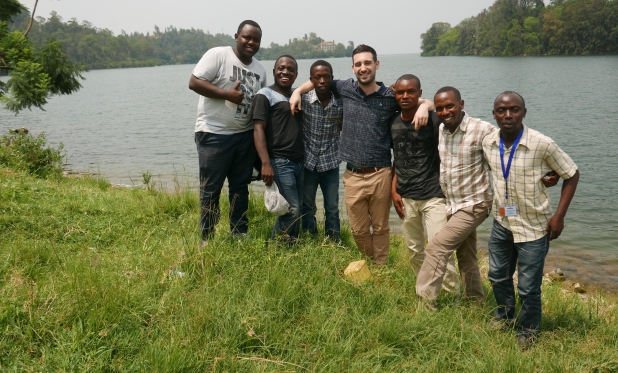Daniel came to AfID looking for a challenge – he wanted an opportunity that gave him a real sense of purpose, one that pushed him further to develop his skills. After what he describes as a ‘four month job interview’ with the organisation he volunteered with (it must have gone well as he now works there too!) we caught up with him recently to find out how he’s getting on in Rwanda and he shares some advice for those thinking about volunteering…
Can you tell us a little about your current role One Acre Fund?
I am a Financial Reporting Specialist and my main responsibilities include performing key balance sheet reconciliations, reviewing balance sheet reconciliations, training finance team staff, investigating and resolving adhoc accounting and systems issues as well as holding responsibility for managing individual country external audits.
Many accountants worry about the transferability of their skills when moving to a new country and sector; have you found any specific experience from your past roles have been particularly relevant?
I have found my skills to be fairly transferable and, as an industry in general, finance and accountancy skills I think tend to be pretty relevant across the globe. I would say the transferability of skills is actually one of biggest positives of a career in Finance.
While of course there are significant differences in working culture and language barriers, I have not had any concerns that my skills are not relevant here. The processes and controls are typically less developed than UK organisations and therefore there is actually a lot a Chartered Accountant can add to these organisations.
My concern is more how relevant are the skills I’m learning now (eg. building things from the bottomup; working with poor systems and in an environment with poor controls) will be to any future career in a more developed economy so it’s about being sure the decision to enter the international development sector is the right one for you.
How easy was it to adapt to living and working in a different culture when volunteering?
Without stating the obvious, I think it is completely dependent on the place and person. Where I am based, in Kigali, I think is very easy. It’s safe and there is a large expat community including at the organisation at which I work and so for me , I have found it a pretty easy place to acclimatise to.
However you must also come with an expectation that things are not going to work in the same way as they do back home and I sometimes see people struggle with that a little at first – though most tend to adapt and really come to love where they are.
I cannot speak for what how easy it is trying to adapt to working in countries such as South Sudan or Central African Republic. I can imagine it would be significantly more challenging but hopefully most people going on assignment to such places are looking for that kind of challenge.
Why did you choose to work in the International Development sector?
I wanted to:
- Understand what it is like to have a job with a real sense of purpose and to experience genuine job satisfaction.
- Travel new parts of the world and integrate into a new culture – not just experience it as a traveller.
- I felt given the likelihood of stretched resources, I would probably be afforded quite a lot of responsibility and the opportunity to grow my skills.
- Taking on a new job, home and social circle at once is challenging, and I wanted to see if I was up to it.
Do you feel your voluntary experience with AfID helped you gain your role at One Acre Fund and prepare for life in your new role? If so, how?
My voluntary experience with AfID was essentially a 4 month interview – so yes clearly it was a key factor. The role I am doing now is essentially the same but taking on some additional projects.
What is your most memorable moment on your volunteering placement through AfID?
Some of the travel opportunities have been fantastic – making new friends and heading to beautiful lakes in Uganda or trekking live Volcanoes in DRC to name a couple. From a work perspective I have enjoyed the opportunity to train others and work on my presentation skills.
What would you say are the pros & cons of your decision to work in the sector?
Some of the pros are:
- Being genuinely proud of the place you work and not feeling as though your sole impact on the world is to make an already rich person richer.
- I think there is an opportunity for greater responsibility than you would be afforded in other sectors.
- You meet a lot of bright, interesting people and become part of a close community of expats. It’s good to be able to share new experiences with likeminded people.
- If you like travel, obviously it’s great.
Some of the cons are:
- Generally it’s not that well paid – I think I am quite lucky that OAF offer comparatively high salaries. My standard of living here is actually higher than in London. Having said that I won’t be buying any million pound properties in London anytime soon.
- You see less of your family and friends. Over time some of your friendships may not be what they once were. The expat community can also be quite transient and so you may find the need to constantly make new friends to replace those who have left which can be quite tiring.
What ‘do’s and don’ts’ would you give to anyone thinking of travelling and working in a less developed country?
- DO expect that what you may consider to be quite simple processes or problem, will become more complicated in a less developed country.
- DO travel as much as you possibly can.
- DO make friends with local people.
- DO use your own initiate and innovation. There is plenty of scope for it actually to be put to good use.
- DON’T think you know better than other people because you come from a developed country.
- DON’T let your preconceptions about a place shape how you experience it.
What would be your advice to other accountants considering a similar career change or looking to break into the sector?
Go for it. You are more likely to regret the things you don’t do rather than the things you do do.


 Name
Name